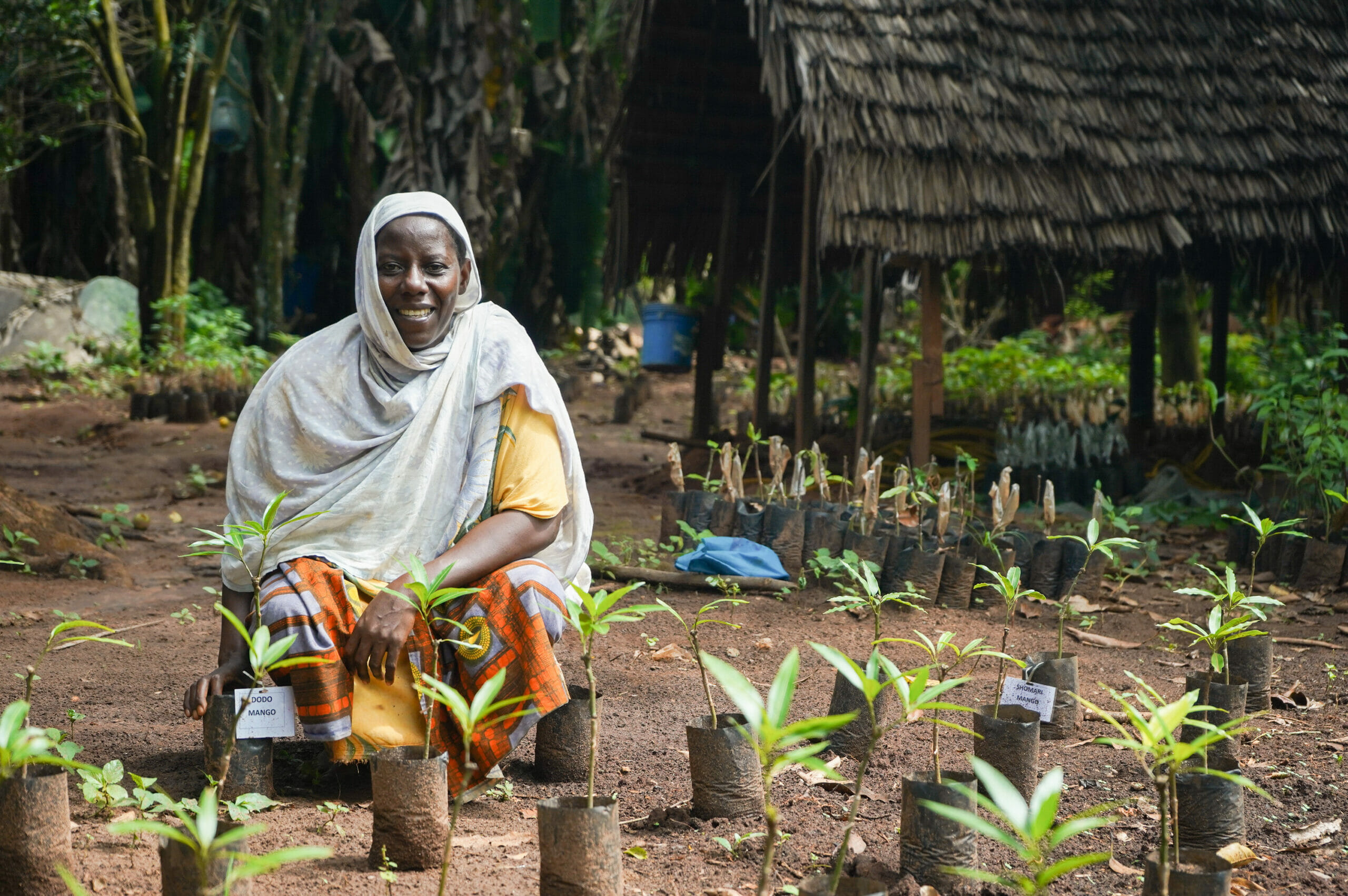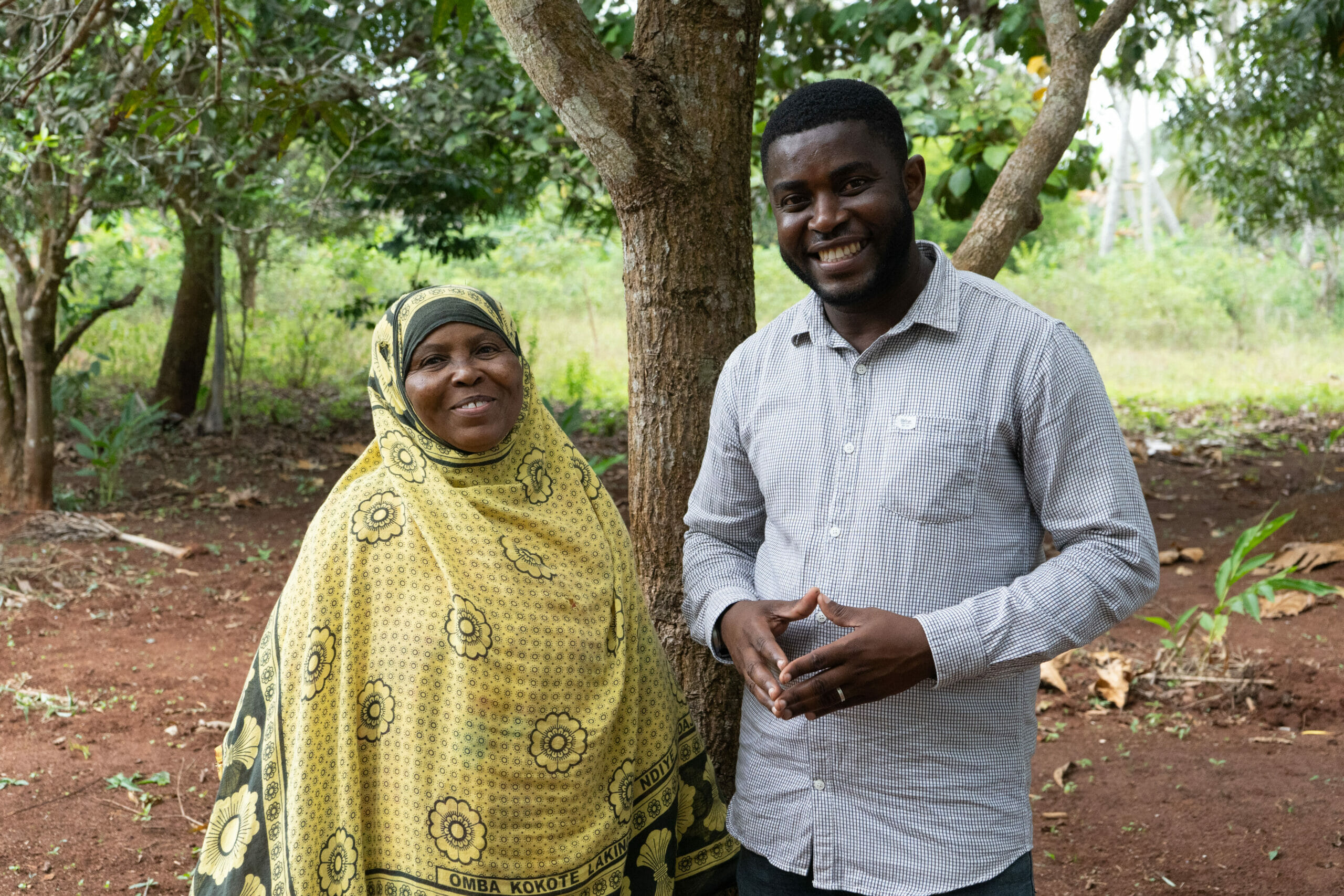VIUNGO: Seeding Resilience
By Rebecca Jacobs, Posted on September 29, 2022
Just over two years ago, Community Forests launched the VIUNGO Project in Zanzibar. Translating to “ingredients” or “spice” in Swahili, VIUNGO is a four-year collaborative effort between local and international organizations in the region. Together, we are working to support small-scale farmers, empower women and youth, and boost economic growth and opportunity—key ingredients in a recipe for resilience.
As we approached the halfway mark, Community Forests Pemba interviewed almost 300 participants from communities across nine districts on Unguja and Pemba Islands—offering a snapshot of the thousands of farmers already participating in the VIUNGO Project. Now we’re excited to share a few highlights with you!
Seeds for change
Growing diverse agroecosystems has the dual benefits of diversifying farmers’ income and the natural ecosystem—increasing resilience from the climate to the community level. That’s why the VIUNGO Project is providing farmers with seeds and seedlings: fruit seedlings like banana, pineapple, avocado, and rambutan; vegetable seeds like okra, amaranth, tomato, and eggplant; all the way to spices like black pepper, cardamom, cloves, and vanilla. Over the past year alone, nearly 20,000 fruit seedlings, 50,000 spice seedlings, and an amazing 32 kilograms of vegetable seeds have been shared with farmers. Farmers across the islands will nurture these seedlings and seeds to grow nutritious foods for their families and for markets.
2,800 farmers provided with resources and technologies, including seeds and seedlings.
What’s more, the majority of these seeds and seedlings were produced in community-run nurseries across the islands! To date, we’ve helped establish 25 community-owned and operated tree nurseries. These nurseries have helped plant over 3 million trees across the Zanzibar islands! Each year, tens of thousands of new tree seedlings are grown to be planted in late-March and April — during what is known as the Masika planting season.

Aviwa Ali Songoroa, a Spice Forest farmer, with grafted mango, lychee, avocado, orange, cinnamon and clove seedlings.
Advancing gender equality
From day one of our work in Zanzibar, increasing women’s equality has been integral to the way we work. Like in many regions of the world, Zanzibari women often face unequal access to assets and income. Through the VIUNGO Project, we’ve partnered with TAMWA, a Zanzibari women’s media company, to support women’s empowerment through on-the-ground activities, challenging cultural norms, and advancing equity policies.
65% of VIUNGO participants have increased their income. For many women, this is their first independently earned income.
Two years into the project, we’re proud to say that over 2,700 women have attended Farmer Field School programming and have started generating income through small-scale horticulture Kitchen Garden activities. In addition to farm business development and management skills, the project is providing these women with tools and materials, including Kitchen Garden kits, seeds and manure, food preservation materials, and tools for plant propagation. At the same time, the VIUNGO project has conducted several community awareness campaigns about advancing women’s economic empowerment in the horticulture sector.

Sauma Othman with Ali Said, Community Forest Pemba’s Spice Forest Officer. After attending the Community Forests’ Farmer Field School, Sauma started to grow cardamom as a source of income to supplement the sweet yam grown by her family in a nearby larger field!
Rooted in community
With the collaboration of trained Agriculture Extension Officers and key farmers, the project has so far established 300 Farmer Field Schools and has enrolled close to 8,000 farmers in various programs to boost climate-smart practices in the field and beyond. By establishing learning hubs directly in the communities, Community Forests can offer agricultural training opportunities that reflect the local knowledge, environment, and needs.
96% of participants have adopted at least one climate-smart horticulture innovation.
Whether focused on agroforestry, spice farming, or Kitchen Garden vegetable production, Farmer Field School participants learn key skills to improve the production of their crops. The curriculum includes sustainable and organic farming practices that cover the entire crop production cycle—from land preparation, water management, and pest control, to harvesting and storage—as well as skills like business management and enterprise creation.
What’s next for VIUNGO?
The survey highlighted several challenges in the work ahead in Zanzibar. For one, increasingly unpredictable rain and longer dry periods mean that water is a continual challenge for farmers. Supplying water conservation units, irrigation technologies, and identifying key areas for boreholes are just a few ways that Community Forests is supporting farmers to take on this challenge.
Undernutrition and lack of nutrition education also continue to be an issue for many participants and their families. That’s why we’re working with the People’s Development Forum Tanzania to run nutrition training programs, and community awareness campaigns, and expand the Kitchen Gardens programming to more families, diversifying their gardens and their diet!
Since day one, our work in Zanzibar has been built on relationships of trust, respect, and the understanding that Community Forests Pemba and the community members we serve are the experts. Our role is to support and uplift this work, channelling resources to those on the ground. We prioritise a community-led approach and seek to actively listen to and support community needs. We’ve supported thousands of farmers already, but there are thousands more who are looking for the support needed to create resilient farming livelihoods.
Do you want to be part of Zanzibar’s community-led movement for resilience? Become a donor today.
